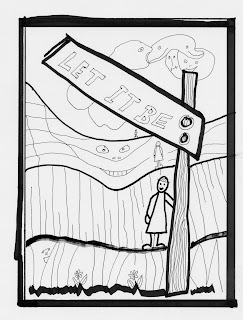When they first meet the ocean most people walk along the
shore and rarely enter more than knee deep. Some people dive in and stay near
the surface while others use goggles, snorkel and flippers to immerse
themselves for longer. A few people use skuba gear and stay deep for even
longer. A very favoured few sit awestruck in a submarine in the great deep where
‘reality’ is wildly weird and sulphurous.
The unconscious is unfathomable like the ocean. Most people
do little more than dampen their mental toes. They fear the psychological
equivalents of killer whales and man eating sharks. They are the simple minded
salt of the earth people who know ‘the truth’ and cling tenaciously to it. They
are easily persuaded to kill and die for king, country and creed.
The persuaders educate and brainwash the masses to ensure
that they act as efficacious workers, consumers and cannon fodder. There are
four main groups of persuaders:
Sacred persuaders: Elders and priests (local, national and
transnational) who are informed, inspired and directed by what is believed to
be an omnicompetent God who works in mysterious ways. (eg John Knox and Scottish
Presbyterianism).
Profane persuaders: Employers and their advertisers and
propagandists who manipulate the perceptions of workers and consumers in small
to medium enterprises and in transnational corporations.(eg Frederick Taylor
and factory line production methods)
Princely persuaders: People who believe in the divine right
of kings (eg Donald Trump as businessman rather than politician)
Outlying persuaders: for cultural evolution to work there
has to be variation upon which selection operates. Tenured academics usually
support the status quo so it is up to freelance philosophers to generate
alternatives. (eg Karl Marx, and the communist manifesto as a paradigm shift).
SO – back to the ocean metaphor.
Most of the persuaders and persuadees remain close to the shoreline.
They acknowledge only their self-conscious and are unaware of what happens in
the 99% of the mindbrain which is the unconscious.
About 2500 years ago there was a busy period for a few
outlying persuaders. They were the mystics who used meditation to still their
monkey mind. They paid heed to their thoughts, feelings and moods and realised
that their mind had a mind of its own and that it was vast. Note that scientists
and engineers were also changing their minds but they did not get much beyond
the myths and magic of those times.
… then a miracle happened …
Today’s sub-mariners are paradigm shifting outliers. The
emerging perceptions draw upon a blend of (a) neuroscience which illuminates
‘how’ the brain works, (b) evolutionary psychology which illuminates ‘why’ it
evolved in the way that it did, and (c) meditation as in mindfulness based
stress reduction.
The ocean is like the unconscious in that their depth and
complexity is vastly greater than the shoreline pundits suggest. Those who go
deep come across amazing things. “Those who speak do not know!”
How many of us will make the shift? – and when?





